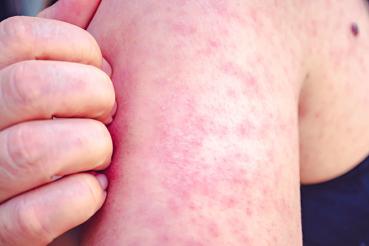In recent years, Brie Ann Muller, MD, a pediatric cardiologist at Rush University Children's Hospital, has seen a growing number of her young patients struggling with heart conditions — like high blood pressure and high cholesterol — that were once reserved for adults. And there's no sign that this trend is slowing down.
"The food choices today and the fact that many kids aren't as active as children in past generations are affecting many children's overall health during childhood. Then, once they hit early adolescence, they are starting to face some very grown-up health problems," she says.
Muller notes that these issues often begin with a child being overweight. According to the Centers for Disease Control and Prevention, childhood obesity affects one in six children and adolescents in the United States. Research shows that children who are obese are more likely to suffer from a number of health problems, including heart disease and type 2 diabetes, by the time they reach adulthood — and, now, sometimes even sooner.
In fact, pediatricians are seeing patients who already have high blood pressure, high cholesterol and type 2 diabetes. Studies have shown that plaque build-up associated with arteriosclerosis, or hardening of the arteries, is already present in some children.
The good news is that kids can turn things around quickly — often more quickly than adults with similar issues. With the right support, kids can get to and maintain a healthy weight, lower their blood pressure and cholesterol, and learn healthy habits that will carry them into adulthood.
Here, Muller shares some ways to help protect or improve your child's heart health.
1. Model healthy habits.
Many risk factors for adult heart disease — such as unhealthy eating and a sedentary lifestyle — can start in childhood. That means healthy habits can start early, too. As a parent, you can influence your child's future health by providing them with the foundation they need to make healthy lifestyle choices.
"Children often model their behavior after what they see their parents and older siblings are doing," says Muller. "This is why it's so important to set a good example. The family needs to set the pattern of healthy choices, which will establish a base for children’s choices as they grow and age."
Exercise
- Try family activities that include aerobic activity, such as swimming or skating.
- Go for walks or bike rides together.
- Play active games (e.g., tag, hopscotch) and sports together.
- Limit family and individual screen time (e.g., television, tablets, video games) to about one hour per day.
Eating
- Eat together as a family, taking your time to enjoy conversation and food.
- Be creative in incorporating more fruits and vegetables into your family’s diet:
- Add fresh berries or peaches to your morning cereal or oatmeal.
- Blend whole fruits and veggies into refreshing smoothies.
- Add sliced cucumbers, peppers or tomatoes to sandwiches or wraps.
- Replace junk foods with whole foods snacks like fruits, nuts, vegetables and small amounts of dried fruits like raisins, apricots and prunes.
- Avoid sugary drinks like soda, juices, juice drinks and coffee concoctions.
- Limit caffeine, and steer kids away from energy drinks, which are loaded with both caffeine and sugar.
- Look for healthy recipes that you can prepare as a family.
Smoking
- Set the example by not smoking, or quitting if you do smoke or use tobacco.
- If you have trouble quitting, don’t expose your children to secondhand smoke.
- Talk to your children about the risks of smoking and using smokeless tobacco.
"These are lifestyle changes that can and should be carried into adulthood," says Muller. "I can't stress enough the importance of establishing these patterns early and reinforcing them through your own example. This can make an incredibly positive impact on the future health of your children."
Children often model their behavior after what they see their parents and older siblings are doing. This is why it's so important to set a good example.
2. Don't be afraid to see a specialist.
If your child is struggling with obesity and heart-related problems, a pediatric cardiologist can provide additional expertise.
"Some parents worry that a pediatric cardiologist will immediately put their child on medications to control high blood pressure or high cholesterol, but that is not the case," Muller says. "I always give children and teenagers time to make changes to their diet and exercise habits before I ever consider starting them on medications."
Muller knows that adopting these changes is not easy. That's why she often recommends that families also work with a dietitian at Rush who can provide nutritional counseling. A dietitian can review food choices, and teach kids and their families how to make adjustments based on their needs and lifestyle.
The goal is to help kids and families incorporate healthy habits that will carry into their adult years, rather than finding quick fixes just to drop weight.
3. Know the signs and your child's risk factors.
Every child grows and develops in different ways. That makes it difficult to know whether your child simply still has some "baby fat" or if extra weight could lead to bigger health problems.
Additionally, aside from weight gain, children do not typically have the same obvious symptoms as adults who have high blood pressure, high cholesterol or diabetes.
Some signs to watch for include the following:
- Shortness of breath (dyspnea)
- Being less active than usual
- Dark, patchy skin on the back of the neck — this is called acanthosis nigricans, a skin condition that can indicate glucose intolerance, an early sign of type 2 diabetes
Additionally, your family history can offer insights into your child's health. "Talking to your child's physician about any family history of high blood pressure, high cholesterol, heart attack or diabetes — especially if there's a history of it developing at a young age — will help us personalize your child's care," says Muller.
4. Find a balance.
While studies show that losing just a little bit of weight can lower high blood pressure in children, there is also a fine line between embracing healthy habits and allowing these efforts to consume you, your child and your family.
"It’s important to find that delicate balance," Muller warns. "You don't want to go to the extreme, with your child obsessing about food at a young age. That can be incredibly unhealthy, too. Developing a healthy relationship with food at a young age is of the utmost importance for future health."
Even if your child is not struggling with weight gain, high blood pressure or high cholesterol, steering them toward healthier food choices and a more active lifestyle now will help them in the long-run.
"Some kids can eat unhealthy snacks without gaining weight or running into health issues. But that's not a lifestyle they can — or should — maintain into adulthood," Muller says. "It's safe to say, if they do, they will be facing these health challenges at some point — and they'll be at an age where it is much harder to make lifestyle changes."




